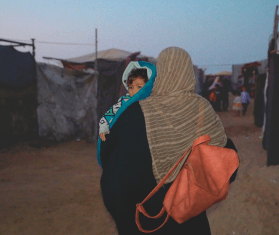More than 7.3 million malaria cases have been reported in Ethiopia this year, according to the World Health Organization (WHO)—nearly twice as many as in 2023. Ethiopia is now one of the highest-burden countries in East Africa. Malaria is yet another challenge for the country’s health care system, which was already grappling with previous and ongoing conflict.
Doctors Without Borders/Médecins Sans Frontières (MSF) teams are responding in two of the most hard-hit regions, Oromia and Gambella. Working alongside the Ministry of Health, MSF’s efforts are focused on preventing, treating, and controlling the mosquito-borne disease in the regions’ most vulnerable communities, including refugees and internally displaced people.
“Malaria this year has been deadly to so many people,” says Aisha, a mother of three, from the Harari region. Aisha came with two of her children to a mobile clinic run by MSF in Oromia, where they were diagnosed with malaria and received medication.
“The health care system has been stretched to its limits, especially with the high number of refugees and displaced people residing in the country,” says MSF head of mission Jocelyn Yapi.

Insecurity raises malaria risk in the Oromia region
In the Oromia region, years of insecurity and limited access to health care have left people increasingly vulnerable to malaria. The region accounts for 48.5 percent of all current malaria cases countrywide, with numbers of malaria patients increasing fivefold between August 2023 and August 2024.
MSF, in collaboration with the Ministry of Health in Oromia, launched an emergency response in July 2024, setting up dedicated malaria wards at Nekemte Specialized Hospital in East Wollega and Nejo General Hospital in West Wollega, where our teams treat around 750 people per week.
“My daughter was in a serious condition,” says Damaya, who took her seriously ill daughter, Martiket, to the emergency room, where she was transferred to MSF’s malaria ward. “The treatment improved her health, and I am so grateful for the care we received.” Damaya also attended health awareness sessions and was given bed nets to protect her family from being bitten by anopheles mosquitoes, which spread the disease and are usually active at night.

Malaria: What to know about the world’s deadliest parasite
Read more“Before, we didn’t use mosquito nets, but after attending MSF’s awareness sessions, I now see how they can help keep us safe,” she adds. “Now I use nets for my children every night.”
Many people in Oromia live in remote areas far from the nearest health center, so MSF has also sent mobile clinics and health promotion teams to reach these communities, and distributed thousands of mosquito nets to help protect people from the disease.

A 150-percent surge of cases in Gambella
In Kule refugee camp in the Gambella region, home to more than 50,000 refugees, malaria cases have surged by 150 percent in 2024 compared to the previous year.
"The situation is alarming," says MSF deputy medical coordinator George Mapiye. "Our teams are seeing highest numbers of malaria infections reported in the last five years. We’re working tirelessly to provide the necessary care and help put in place preventive measures and treatment, including vaccinating children against the disease.”
In the Kule health center alone, MSF has diagnosed and treated more than 36,000 malaria patients since the beginning of 2024. In collaboration with local authorities and other actors, MSF has implemented environmental and control measures including indoor residual spraying, reaching more than 80 percent of households that were targeted in the camp. MSF also launched intermittent preventative treatment in children prior to the peak of malaria season. Our teams are administering the newly WHO-approved R21 malaria vaccine to children under 5 years old. So far, MSF teams have given three doses of the R21 vaccine to 2,750 children, with a fourth dose due to be administered after 12 months.
An urgent and targeted response is needed to control the ongoing malaria epidemic in Ethiopia. With malaria cases in the country surging to unprecedented levels, it’s important to take a multi-pronged approach that includes case management, malaria prophylaxis, vaccines, and vector control measures. In light of seasonal changes, regional crises, and population movements, it is also critical to prioritize response preparedness in high-risk areas and among vulnerable communities for maximum impact.

About our work in Ethiopia
MSF has been providing essential medical care in Ethiopia for more than four decades, focusing on communities affected by conflict, displacement, and disease outbreaks.
MSF’s comprehensive approach includes providing mother and child health care, providing emergency surgery, treating infectious diseases, and addressing malnutrition. MSF teams work closely with local health authorities and local communities to improve medical care, health education, and preventative treatments, and to ensure a coordinated response, particularly in areas with limited health care resources.
MSF teams were forced to suspend most operations in Ethiopia in September 2021. MSF was then able to return to Tigray in November 2022, the region was emerging from a devastating two-year civil war. The war caused significant damage to infrastructure, whether due to lack of maintenance, intentional destruction, or the fighting. Health facilities were hardly functioning.
The latest on malaria
November 25 09:00 AM
A triple emergency in Kenya amid malaria and measles outbreaks
Recent heavy rains have resulted in malaria outbreaks in Baringo and Turkana counties, while Marsabit county contends with the spread of measles.
Read More
November 21 09:24 AM
Mass malaria treatment in South Sudan significantly reduces cases
A mass vaccination and treatment campaign in Twic County has contributed to a significant reduction in malaria cases, especially among vulnerable children.
Read More
November 07 11:48 AM
Alarming spike in childhood malaria admissions in South Sudan
A recent surge in malaria cases in Aweil highlights the impact of flooding and funding cuts for medical care.
Read More




